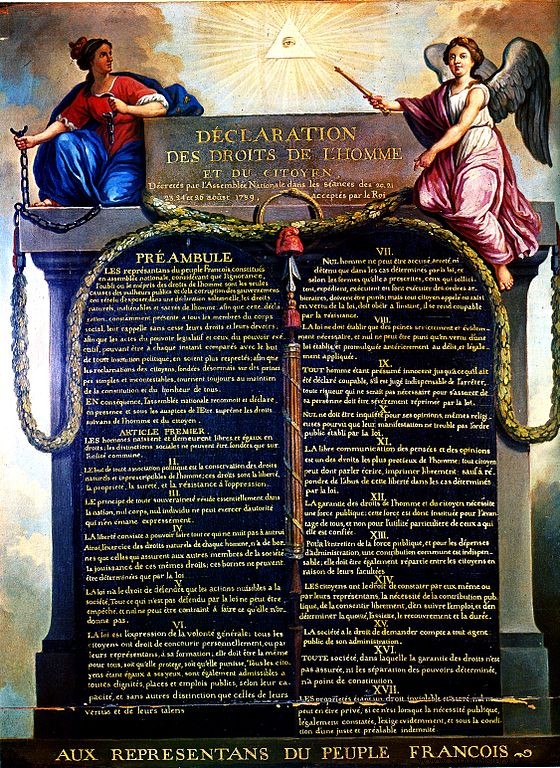- On June 20, the deputies took the oath around Bailly in the Jeu de Paume room. Now reunited in the National Assembly, they decide not to leave the room before giving a constitution to France. This is the tennis oath.
- On July 14, Parisians besieged the Bastille prison.
- On August 4, the uprising of peasants throughout the country (Great Fear) resulted in the vote of the abolition of the feudal privileges and rights of the Clergy and the nobility by the National Constituent Assembly.
August 26, 1789

Characters
Jean-Joseph Mounier
Emmanuel-Joseph Sieyès
Gilbert du Motier alias La Fayette
Anne Antoine Jules de Clermont-Tonnerre
Jérôme Champion of Cicé
Honoré Gabriel Riqueti alias Mirabeau
Procedure
The Declaration of the Rights of Man and of the Citizen was written from August 20 to 26, 1789 after discussions started in July. Adopted and then voted on after it was written, it forms the preamble to the Constitution of 1791. This text symbolizes the culmination of the aspirations of the Enlightenment. It is inspired by Anglo-Saxon declarations, the philosophy of the Enlightenment, the achievements of previous sessions, as well as the grievances of 1789. Three successive committees are working on the synthesis of these ideas into a text whose impact will be international. /P>
Seventeen articles make up the final text, mixing the rights of the individual with those of the nation. The “imprescriptible” rights of man are mentioned there:freedom, property (inviolable and sacred), security, resistance to oppression. Moreover, they establish and organize the politics of the new society, as well as the relations of its citizens.
The principles of freedom, civil equality and national sovereignty put an end to the abuses of royal arbitrariness denounced by the Enlightenment. Although voted, the Declaration will not be official until the proclamation of the Constitution on September 3, 1791.
Consequences
- The vote on the Declaration of the Rights of Man and of the Citizen affirms the principles of June 1789. It is proclaimed on November 3, 1789 but will be formalized with the proclamation of the Constitution of 1791, on September 3.
- This text marks the end of the Old Regime and the advent of a new universalist society. The kingdom becomes a potential "Republic" and the subjects become French citizens, all equal before the law and taxes. They are therefore endowed with inalienable individual freedoms, such as freedom of expression, opinion, religious conscience, as well as the freedom of self-determination prohibiting all forms of servitude.
- The power of the king is diminished by the principles of separation of powers, depriving him of his legislative power, and by the foundation of the principle of national sovereignty.
